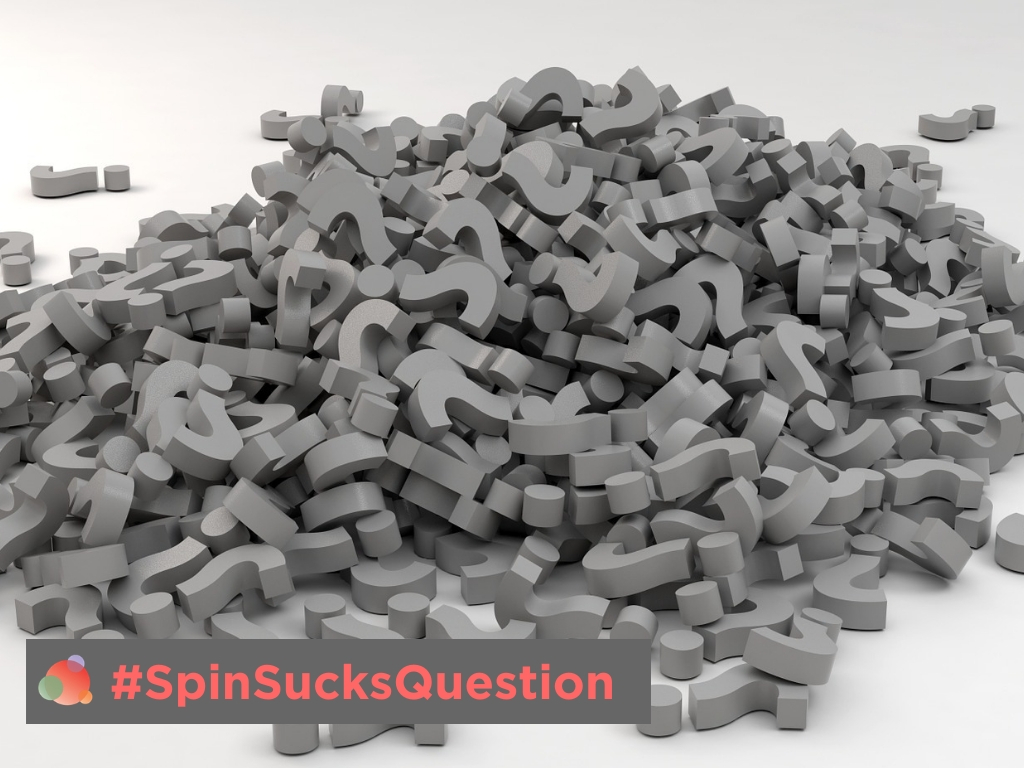 We’ve been increasing our spend on Facebook ads lately, which means we’re reaching a larger audience.
We’ve been increasing our spend on Facebook ads lately, which means we’re reaching a larger audience.
This is great because it gets the Spin Sucks training programs in front of way more eyes.
The downside is, the more people who see your ad, the bigger chance someone is going to pop up and be a jerk for no reason.
You know, as internet trolls are wont to do.
We’ve had a few of these lately, and one of the duties I have at Spin Sucks is to respond to these comments, as needed.
If people are genuinely giving us feedback, even if it’s negative, I reply by thanking them or asking to know more about their issues.
We welcome feedback!
It’s always good to get constructive comments from people who aren’t directly involved with our community.
But trolls?
They’re met with a gif or some witty remark.
At least I can try to turn things around by having some fun with it.
Thinking about all that gave me the idea to base this week’s #SpinSucksQuestion around how to respond to internet trolls.
I asked:
How do you deal with internet trolls and negative comments? Not the people who are leaving genuine feedback, but the ones who are there just to be jerks.
I knew I would get some excellent responses from our Spin Sucks community on Slack.
Slide Into Their DMs
No. Not that way. We’re talking about taking the conversation out of the public eye.
Lindsay Scarpello said:
If the frown can’t be turned upside down, try to take them to a DM. If that’s not a possibility, hide them. They won’t know they’re hidden (specifically on FB). I look at it this way: they’re taking my ad space, and I’ve done everything in my power to respond to their issue.
A few of our responders followed one simple rule.
Don’t Feed the Trolls
Deirdre Lopian is a strong supporter of this camp:
Social media trolls often are found in their mother’s basement and project their self-hatred behind what they think is the safety of their keyboard. Almost always, they act this way for attention by looking for a fight. Before engaging, confirm you are dealing with a troll and not an unhappy customer.
After you have confirmed you are dealing with a troll, I recommend the following:
-
Don’t feed the troll—aka ignore them and don’t be baited by their behavior. Continue to build a conversation with others who are genuinely adding feedback or asking questions. The lack of attention will force them to move on.
-
If it doesn’t, or other commenters are feeding the troll, you should try humor…but only if you are good at it, or you could make the situation worse. Witty responses humanize brands and allow them to connect with and engage their audiences. Your troll may or may not appreciate the response but other commenters will appreciate your attempt at diffusing the situation, thereby building a stronger community.
Ozan Toptas agreed about ignoring them:
“Haters gonna hate”, “don’t feed the trolls” is generally my attitude when it comes to trolls.
That said, if there is a possibility it’s a legitimate comment with the wrong information, that’s something I try to correct, with respect and without emotion.
If you have an engaged fan base you can leverage against online comments, I think you can count on them to correct the wrongs. But for that to be possible, you need to disperse information AND have ready-to-go materials.
I think of this as a social media “train and equip program”—pretty much inspired from the military ops with the same name.
A Silver Lining?
If you’re starting to notice trolls pop up on your content, the good news is it means people are seeing it.
And for every troll that leaves a negative comment, there are many more people who are looking at your ad and considering your product.
Chris Williams said:
One, if you have trolls, you’re garnering attention. That’s a good thing overall—it means your branding efforts have had an effect!
Two, resist the temptation to block trolls by IP address. You may have a persistent troll who uses the same IP/email/other identifying technical characteristic.
Just one filter and they go away, right? They will…but you risk blocking out a whole segment of legitimate traffic. We’ve seen customers do this, and end up with broken communications, loss of website traffic, and angry customers. That’s not worth it to ‘get’ one troll.
Responding to Internet Trolls
Trolls are part of the package when it comes to social media.
It’s unfortunate and I often wonder, “Who has enough time on their hands to leave all those comments?!”
But it doesn’t do me any good.
They’re not going anywhere, so we just have to keep up the good fight.
Have you had experience with internet trolls? How do you handle them? Tell us in the comments!